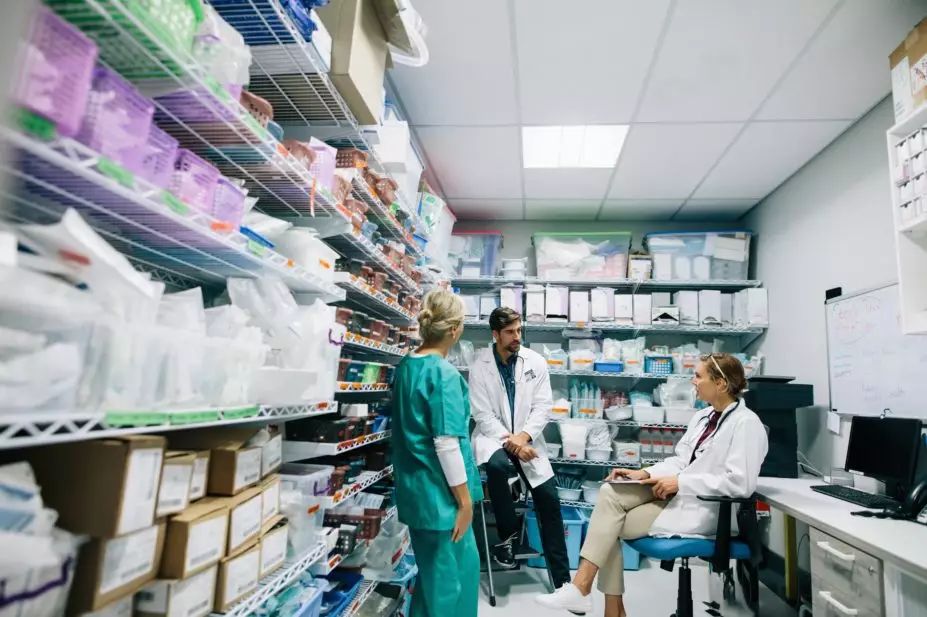
Shutterstock.com
Foundation training for pharmacists has been talked about for years, but the arrival of the COVID-19 pandemic has meant a swifter-than-expected introduction for the concept.
The idea is a simple one. The pharmacy degree and the preregistration year do not cover the range of skills that newly qualified pharmacists need to work across all sectors of the health service. Extra on-the-job training is needed as pharmacists’ roles are changing rapidly and training is struggling to keep pace.
But it took a global pandemic for the start of a national scheme to be announced in England. From September 2020, a voluntary interim foundation programme has been available to provisionally registered pharmacists, who were unable to take the preregistration exam due to the pandemic.
In Scotland, provisionally registered pharmacists are able to sign up for NHS Education for Scotland’s (NES’s) Pharmacist Foundation Training Programme, which has been running for some years.
Health Education and Improvement Wales (HEIW) support for provisionally registered pharmacists includes self-assessment competency frameworks and signposting to other resources, including continuing professional development.
The General Pharmaceutical Coucil (GPhC) has set out plans for a permanent, nationwide scheme, planned for launch in 2021, in what would represent the biggest change to pharmacy education in a generation. Although the details are still being worked out, this article summarises the latest information we have on how it might work in practice.
Why is pharmacy foundation training needed?
Foundation training is something medics have benefited from for some time. In the UK, doctors begin a two-year foundation programme immediately after graduation and, at the end of that programme, they receive a full registration to practise from the General Medical Council. Dentists must also undertake a one-year foundation programme before they can practise independently in the NHS.
Until now, pharmacists have had patchy access to post-registration training, but according to a Health Education England (HEE) report, ‘Advancing pharmacy education and training: a review’
, published in June 2019, the rapid changes in medicine and medical technologies are “driving the thinking about the need for a new career framework”.
An understanding of pharmacogenomics, advanced therapeutic medical products and digital health will be crucial to the pharmacy workforce in the near future, says HEE, adding that the current approach to pharmacist foundation training will not meet demands for a “sustainable clinical pharmacy workforce” that is ready to meet the challenges of dealing with complex conditions across multiple settings.
This is not a new idea, is it?
No — in its June 2019 report, HEE estimated that about a third of newly registered pharmacists in England were undertaking some form of foundation training. But pharmacy foundation training has always been optional, and there is a lot of variation in the programmes offered:
- The Royal Pharmaceutical Society (RPS) has been running a foundation programme since 2014. Open to Society members from all pharmacy sectors, the programme covers the first 1,000 days of practice.
- Rowlands Pharmacy and Boots are accredited RPS foundation training providers. Likewise, the Centre for Pharmacy Postgraduate Education’s foundation pharmacist training pathway is mapped to the RPS programme.
- In October 2019, LloydsPharmacy introduced its own voluntary, one-year foundation programme.
However, for the first time in September 2020, HEE offered a centrally funded Interim Foundation Pharmacist Programme (IFPP) for all provisionally registered pharmacists in England. The programme is not mandatory, and can complement workplace foundation training programmes.
As of 4 November 2020, there were 1,400 provisionally registered pharmacists signed up to the IFPP.
In Scotland, hospital pharmacists have been able to undertake vocational foundation training since 2007, led by NES Pharmacy. In 2017, this was broadened to include pharmacists working in primary care and has since been accredited by the RPS. In light of the GPhC’s plans, a spokesperson for NES told The Pharmaceutical Journal that “NES will review and reframe our post-registration foundation training programme in both name and learning outcomes when required.” The spokesperson added that “the intention remains that there will be a post-registration training programme for all newly qualified pharmacists in Scotland from September 2021, with supporting infrastructure. This will follow on from the current preregistration training year”.
In Wales, HEIW introduced a foundation programme for pharmacists, mainly in the community pharmacy sector, in 2020.
Why has an interim scheme been introduced now?
The COVID-19 pandemic led to the postponement of the registration assessment. So, for the first time, the GPhC created the status of “provisional registration”. Anyone who has passed the MPharm and completed 52 weeks of preregistration training in the last year could go onto a provisional register, legally allowing them to practice as pharmacists; albeit provisionally, and for a time-limited period. It’s currently anticipated that the registration assessment will take place in the first three months of 2021.
The Interim Foundation Pharmacist programme was set up to support provisionally registered pharmacists as they move towards full GPhC registration. It is aligned to the RPS’s interim foundation pharmacist curriculum, and registering on the IFPP provides access to the RPS e-portfolio — where evidence of learning can be saved — and the RPS Provisional Registration Service Support Line.
HEE also said that the programme is a “unique opportunity to accelerate pharmacist early years education and training reform”.
What does foundation training involve?
This training aims to help pharmacists further develop their knowledge, skills and behaviours, as well as gather evidence of their existing skills and competencies. The RPS’s existing foundation programme
includes areas such as patient consultations, medicines monitoring, transfer of care, communication skills, working in multidisciplinary teams and clinical governance.
Existing programmes last between 365 days and 1,000 days, and are undertaken in the workplace with support from a tutor. They feature a mix of workplace assessments and portfolio construction, and place emphasis on self-assessment and reflection.
The provisional scheme in England provides pharmacists and employers with access to a range of online resources, including the RPS’s e-portfolio for provisionally registered pharmacists, which includes supervised learning and self-assessment tools and can be used to collate evidence of learning.
The interim programme looks for development of newly qualified pharmacists across five areas: professional practice; communication and collaborative working; leadership and management; education; and research. Assessment of provisionally registered pharmacists’ learning during the interim foundation year will be “very light touch”, the RPS — which has produced the interim foundation curriculum— has said, with no requirement for summative — that is, assessed — evidence that the foundation pharmacist in training has met the curriculum outcomes.
However, the RPS has described the interim foundation curriculum as a “bridging” curriculum, which will allow for a “seamless transition” to a mandatory national foundation programme next year.
So when will we see a mandatory national scheme?
Across the UK, the preregistration year will be replaced by a foundation year in July 2021. But the GPhC said it was still discussing how the foundation year would work “in practice”.
An education governance oversight board (EGOB) — which includes the four UK chief pharmaceutical officers and representatives from the RPS, the GPhC, NHS Education and Training, universities and employers — is tasked with overseeing pharmacy postgraduate education and training more widely. Replacing the current pre-reg year with a national foundation programme has the “strong support” of the EGOB, the GPhC has said.
Prior to the pandemic, the RPS launched a framework for a national foundation programme on 17 November 2019, at its annual conference. It is currently developing a national foundation pharmacist curriculum to “provide a standardised approach to foundation training regardless of sector or geography”. This will, it has said, be “underpinned by the RPS Foundation Pharmacist Framework (2019)”.
This national foundation year is part of a broader set of changes to the initial education and training (IET) of pharmacists. Mark Voce, director of education and standards at the GPhC, has said that major reforms would arrive “in phases”, starting from 2021.
These changes to IET will bring a “strengthened and more integrated five-year programme” which provides a “continuum of training”, Voce said. However, the degree will still be awarded after four years.
Will the national foundation programme include independent prescriber training?
The GPhC has said that, ultimately, those completing the foundation year would be independent prescribers by the time they join the register. However, it added that implementation of this “needs to take account of each country’s circumstances and be subject to appropriate consultation”.
And this will not start from 2021: it is a longer-term plan. The regulator told The Pharmaceutical Journal that changes will be made to the degree and the foundation training year, with the aim that students who begin their degree in the future will join the register with their independent prescriber qualification in place.
For now, Scotland has said that, from September 2021, pharmacists will be able to undergo independent prescriber training after they have completed the NES pharmacy foundation training programme.
Will graduates be paid during their foundation training?
Graduates are employed and paid a salary during their preregistration year, and the GPhC has confirmed that this will not change for foundation trainees on the national scheme. It has also said that current MPharm students will not have to pay fees for the foundation year once they graduate.
However, the RPS has said clarification is needed on the financial impact on future graduates. It has also asked for confirmation that funding will be provided for any additional clinical placements in years 1–4 of the MPharm, if the plan is to “upskill future graduates to become independent prescribers”.
It sounds like it is still early days. When will we know more?
There is still much detail to be decided about exactly how this significant change to post-degree training will happen in reality: but the GPhC approved the new standards for initial education and training of pharmacists at a meeting of its council, held on 10 December 2020. The regulator will now, it said, work with the standards advisory group and “directly with the statutory education bodies, higher education institutions, the NHS in each country of Great Britain, and other employers, to develop a transition plan for implementing the standards in stages over the coming years”.
The changes — including enabling pharmacists to independently prescribe from the point of registration — will, the GPhC said, be introduced “at the earliest possible opportunity”.
Box: Timeline
July 2017 — the concept of a UK-wide, mandatory foundation programme first proposed by the Royal Pharmaceutical Society (RPS);
March 2018 — the UK’s four chief pharmaceutical officers write to the RPS endorsing the proposal and asking the faculty and education board’s task and finish group to take the proposal forward;
November 2019 — the framework for the foundation programme is launched by the RPS;
July 2020 — Health Education England and NHS England announce proposals to replace the current preregistration year with a one-year foundation;
July 2020 — General Pharmaceutical Council announces it has reconvened a working group to “drive implementation” of the proposals;
September 2020 — launch of Interim Pharmacist Foundation Programme for provisionally registered pharmacists;
Spring 2021 — launch of foundation curriculum expected.
This article was updated to include the GPhC’s approval of the new standards for initial education and training of pharmacists on 10 December 2020.


